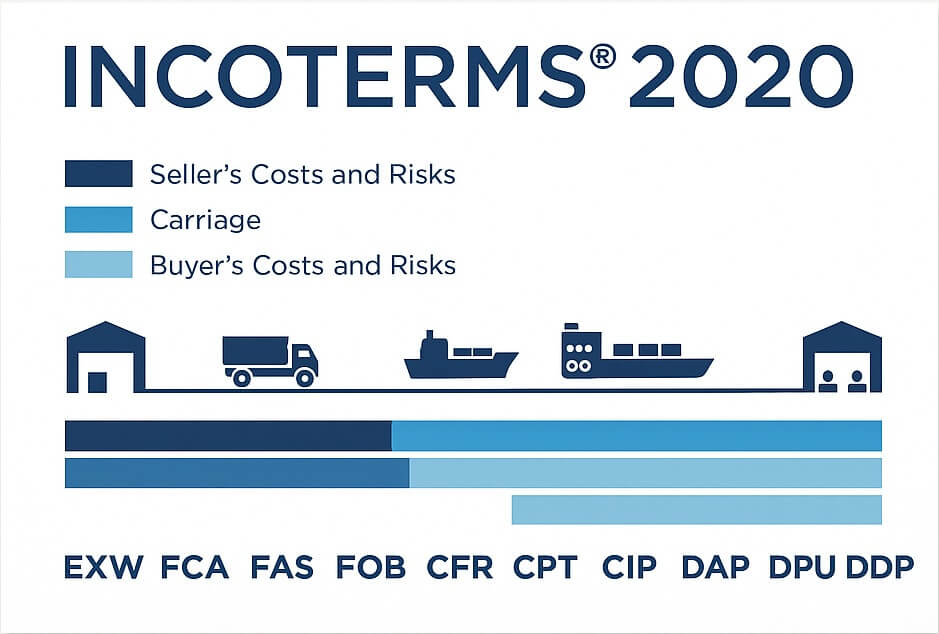As part of negotiations related to international commercial transactions between an importer and a manufacturer, the parties are required to sign a contract that regulates their business activity and protects both parties to the transaction.
In order to execute and complete the transaction, the parties must reach agreements and decide where and when the goods will be delivered, who will be responsible for customs, the quality and responsibility of the transportation, insurance of the goods during transit, and more.
INCOTERMS are international rules prepared by the International Chamber of Commerce (ICC) that regulate various aspects of international commercial transactions.
It is important to note that the rules are periodically updated by the International Chamber of Commerce; therefore, it is recommended to consult a lawyer who specializes in the field at the pre-contractual stage.
As mentioned, the INCOTERMS rules define responsibilities by determining which party is responsible for:
- Loading/unloading the goods;
- Insuring the goods;
- Customs clearance of the goods.
Additionally, the rules regulate the allocation of costs, whether during transportation or after, and of course, the transfer of risk between the parties to the transaction.
There are two main categories of INCOTERMS:
- Rules intended for land, air, sea, or combined transport;
- Rules intended solely for maritime transport.
Common INCOTERMS:
- EXW (Ex Works) – Under an EXW agreement, the seller’s obligation ends once the goods are made available to the buyer.
- FCA (Free Carrier) – Under an FCA agreement, the goods are delivered to a location agreed upon in advance into the possession of an international carrier sent by the buyer. Once the goods are delivered to the carrier, full responsibility transfers from the seller to the buyer.
- CPT (Carriage Paid To) – Under a CPT agreement, the seller is responsible until the goods reach the destination port. Insurance relevance shifts to the seller when the goods are handed to the international carrier at the port of origin. Like FCA, responsibility transfers from seller to buyer upon delivery to the carrier. The seller is obligated to deliver the goods and pay transport costs to a point before customs.
- DAP (Delivered at Place) – Under a DAP agreement, the seller is responsible for delivering the goods to an agreed point in the import country. Unloading and customs clearance are the buyer’s responsibility.
- CIP (Carriage and Insurance Paid To) – Similar to CPT, but under a CIP agreement, the seller insures the goods for the buyer’s benefit.
- DDP (Delivered Duty Paid) – Under a DDP agreement, the seller delivers the goods to the destination country and pays all costs. Unloading is the buyer’s responsibility.
- FOB (Free On Board) – Under an FOB agreement, the seller is responsible for loading the goods onto the ship at the port of origin. Once the cargo is on board, responsibility, including payments and insurance, passes to the buyer.
- FAS (Free Alongside Ship) – Under a FAS agreement, the seller’s responsibility ends once the goods are placed alongside the ship at the port of origin.
- CFR (Cost and Freight) – Under a CFR agreement, the seller pays for maritime transport, but the risk passes to the buyer when the goods are placed on the ship at the port of origin.
- CIF (Cost, Insurance, and Freight) – Similar to CFR, but under a CIF agreement, the seller also insures the goods.
It is important to emphasize that relying on INCOTERMS in a contract to regulate only basic aspects does not cover all legal bases and thus does not provide full legal protection. It does not replace legal consultation with a qualified attorney.
The expertise of Hawel-Tocker & Co. team in drafting and reviewing commercial agreements and international contracts is based on many years of experience, deep familiarity with the international legal system in general, and the Israeli and Polish markets in particular. It is advisable to ensure that agreements are clearly drafted and protect the interests of the parties, with emphasis on the complexities of legal issues in international trade.
Our firm, operating through offices in Israel and Poland, brings more than 25 years of experience in accompanying international transactions. We offer our clients the significant advantage of deep understanding of both legal systems, alongside comprehensive familiarity with the business culture in both markets. This approach allows us not only to resolve legal disputes efficiently but also to prevent them from occurring in the first place.

